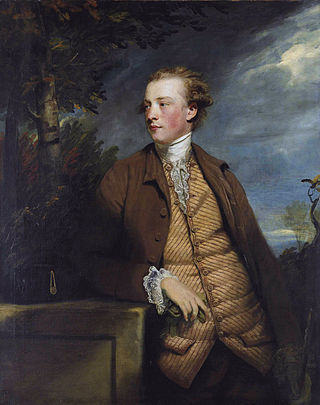Related Research Articles

Richard Talbot, 1st Earl of Tyrconnell, was an Irish politician, courtier and soldier.
George Feilding, 1st Earl of Desmond was an English nobleman, awarded the title of Earl of Desmond in the Peerage of Ireland by Charles I under the terms of a letter patent issued by James I. He was created Registrar of the Court of Admiralty, for life, in 1625.

Denis Daly of Carrownakelly and Dunsandle Castle, Loughrea, County Galway, was an Irish landowner and politician.

Theobald Dillon, 7th Viscount Dillon of Costello-Gallin supported King James II, was attainted on 11 May 1691, and fell in the Battle of Aughrim during the Williamite War. His attainder was reversed in favour of the 8th Viscount on 20 June 1694.

Henry Dillon, 8th Viscount Dillon was an Irish soldier and politician. In 1689 he sat in the Patriot Parliament. He fought for the Jacobites during the Williamite War, defending Galway against Ginkel and surrendering it in 1691 after a short siege. He obtained the reversal of his father's attainder in 1696 recovering his father's lands.
The Recorder of Dublin was a judicial office holder in pre-Independence Ireland.
Sir William Talbot, 1st Baronet, was an Irish lawyer and politician. He sat as MP for County Kildare in the Parliament of 1613–1615 and was in 1628 one of the negotiators of the Graces. However, he is probably mainly remembered as the father of Richard Talbot, 1st Earl of Tyrconnell.

John Burke, 9th Earl of Clanricarde was an Irish soldier and peer who was a colonel during the Williamite War in Ireland.
Sir Henry Lynch, 1st Baronet was an Irish baronet, knight, lawyer, and land agent. Lynch was among the first of his family to become a lawyer, and several of his younger sons followed him into this profession, as did, under his influence, Patrick D'Arcy, Richard Martyn, and Geoffrey Browne as well as many of the later generations of the Tribes of Galway.
St George Daly was an Irish judge, who had a reputation for ignorance of the law. He owed his career advancement entirely to his support for the Act of Union 1801, which did nothing to enhance his standing in the legal profession.
Sir Michael Smith, 1st Baronet (1740–1808) was an Irish judge. He was the founder of a judicial dynasty, several of whose members were noted for eccentricity. He was also the first of the Cusack-Smith baronets of Tuam.
Sir Richard Pyne was an Irish landowner, barrister and judge. He held office as Lord Chief Justice of Ireland from 1695-1709.
Sir Richard Ryves (1643–1693) was a seventeenth-century Irish judge who served for several years as Recorder of Dublin, and subsequently as a Baron of the Exchequer. He was briefly a Commissioner of the Great Seal.
Sir Edward Sullivan, 1st Baronet, PC (Ire) was an Irish lawyer, and a Liberal Member of Parliament for Mallow, 1865–1870 in the House of Commons of the United Kingdom of Great Britain and Ireland. He was also Solicitor General for Ireland, 1865–1866, Attorney General for Ireland, 1868, Master of the Rolls in Ireland, 1870. Created a baronet, 29 December 1881, from 1883 to 1885 he was Lord Chancellor of Ireland.
Sir William Talbot, 3rd BaronetPC (Ire) was the last of the Talbot baronets of Carton: his title was forfeited on account of his loyalty to King James II of England. He was an Irish politician and judge, who served briefly as Master of the Rolls in Ireland.
Sir John Barnewall (c.1635-c.1705) was an Irish landowner, barrister and judge, who held several judicial offices, including that of Recorder of Dublin 1687-9.
Ulick Burke, 1st Viscount Galway was an Irish army officer slain at the Battle of Aughrim while fighting for the Jacobites during the Williamite War in Ireland.
Sir Henry Talbot of Templeogue, County Dublin, and Mount Talbot, County Roscommon, was a seventeenth-century Irish Catholic landowner, who was elected MP for Newcastle Borough in 1640. His marriage made him a brother-in-law of Richard Talbot, 1st Earl of Tyrconnell.

The recorder of Kinsale was a judicial office-holder in pre-independence Ireland. He was the chief magistrate of the town of Kinsale. Given the population of the town, which has fluctuated between 5000 and 7000 over the years, the need for a full-time judge may be questioned. However Kinsale has been a chartered town since 1334, and the charter granted by Elizabeth 1 in 1589 explicitly provided for the office of Recorder, as did that granted to Clonakilty by James I in 1613. The first recorder of Kinsale whose name is definitely known is Robert Slighe, who served in that office between approximately 1601 and 1615.
Theobald Bourke, 3rd Viscount Mayo was an Irish soldier, landowner, member of the Irish House of Commons, and peer. As Viscount Mayo in the peerage of Ireland, he had a seat in the Irish House of Lords from 1649 until his death.
References
- 1 2 3 4 Ball, F. Elrington The Judges in Ireland 1221-1921 John Murray London 1926 Vol.1 p.307
- 1 2 Cokayne, George Edward (1900). Complete Baronetage (Volume 1). Exeter: W. Pollard & co., ltd. p. 241.
- ↑ Burke's Peerage 4th Edition London 1802 Vol.1 p.123
- 1 2 Ball p.364
- 1 2 Ball p.304
- ↑ Burke's Peerage p.123